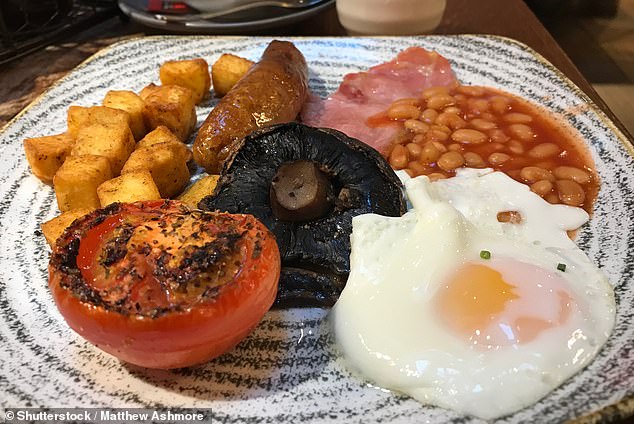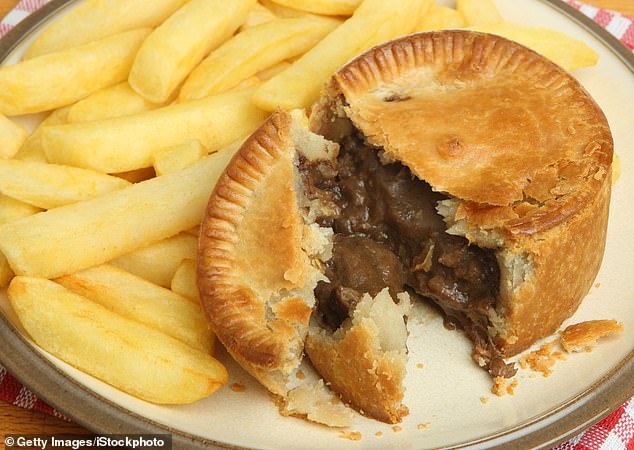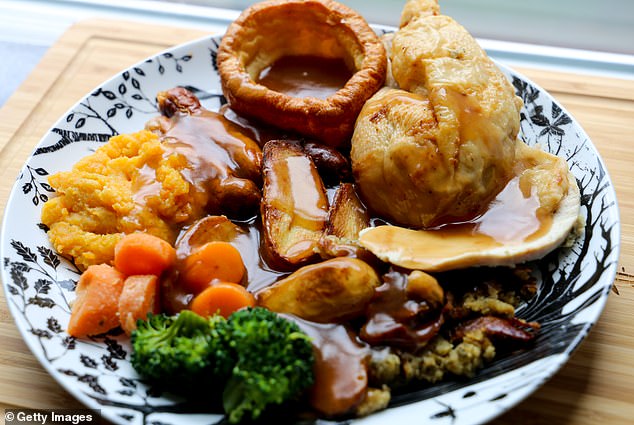A full English breakfast has been named one of the worst meals for your health in a study ranking traditional dishes from around the world.
The beloved UK dish was ranked against the likes of Turkey’s döner kebab and America’s cheeseburger and fries in a survey by health brand FeelGut.
The meal – which typically boasts of sausages, bacon, beans, bread, eggs, hash browns, black pudding, mushrooms and tomatoes – has been shamed for having the most calories out of any national dish.
Containing a whopping 1,279kcal, the breakfast had 95 per cent more calories than the average (673kcal) found in the other top 20 dishes.
The meal also contains six ultra-processed ingredients, while other 19 meals only contained an average of 1.6 – and had 204 per cent more sodium.
And even though the meal appears savoury, it has 65 per cent more sugar than the 5.2g global average.
In second place was Australia with their meat pie and chips, while Turkey’s beloved takeaway was third.
The US was fourth with a cheeseburger and fries, narrowly followed by Canada’s poutine.

A classic British meal has been named one of the worst for your health in a new study (stock picture)

A full English breakfast has been named one of the worst ‘national’ meals for your health after it was revealed to have a whopping 1,279kcal (stock image)
On the other end of the league table was South Korea’s kimchi and rice with only 300kcal and one gram of fat, and then Japan’s miso soup and rice with 264kcal but three grams of fat.
However, fibre content was low across the board, with even the most fibrous of dishes providing between 40-60 per cent of the recommended 25g a day.
This is an issue most Brits struggle with, as it was revealed 90 per cent of the population do not reach this target.
Eating ultra-processed foods (UPFs) strips out natural fibres, live enzymes and phytonutrients which are crucial for your gut health.
Although they are designed to be convenient, have a long shelf life and be palatable for most people, too many can lead to obesity, diabetes, cardiovascular disease, certain cancers and several other diseases.
Sarah Morton, a Specialist Registered Dietitian at FeelGut, said: ‘This analysis sheds light on just how nutritionally imbalanced many of our most beloved traditional dishes can be especially when it comes to ultra-processed ingredients, excess saturated fat, sodium, and low fibre content.
‘These are not just minor dietary concerns; they’re major contributors to long-term health risks like heart disease, type 2 diabetes, and inflammatory conditions.
‘The goal isn’t to remove cultural foods from our plates, but to bring greater awareness to their composition, and consider simple adjustments like boosting fibre, reducing additives, or incorporating more fermented foods that can support gut health and overall well-being.

Australia’s meat pie and chips came in second in the rankings for health

Turkey’s Döner Kebab came in third with just under a 1,000 kcal

Fourth in the rankings was a cheeseburger and fries from the U.S.

Roast dinners, a classic British staple in many households, did not make the list
‘There is always a way to make a meal healthier and that can simply be done by the method of cooking a food, or by substituting an ingredient for a slightly healthier option.’
Some ways to bring down the calories in the breakfast meal is to swap out pork sausages for turkey sausages, which cuts out 10g of fat and 60 kcal.
Lean turkey brands are often minimally processed which means fewer emulsifiers and colouring.
Having poached eggs instead of fried eggs will save 20kcal as they don’t need oil.
The research also suggested to try trimmed and grilled back bacon in stead of regular back bacon, which will reduce fat by 33 per cent and remove any brine additives.
Wholegrain toast instead of fried bread will add two extra grams of fibre, while getting rid of 120kcal and ultra-processed batter.
Making the baked beans at home instead of buying a tin saves 20kcal while dropping additives and sodium.
For the ultra-keen, adding spinach and kimchi to the full English instead of the typical mushrooms and grilled tomato will add a gram of fibre to your meal among other micro-nutrients and the popular fermented cabbage is beneficial to gut health.
Altogether, this would bring your breakfast down to 227kcal, instead of a whopping 1279kcal.
The fat content also halves from 89.5g to 44g.
The most unhealthy ‘traditional’ dishes ranked Ranking Country Dish kcal Fat (g)Sugar (g) Sodium (mg) Fibre (g) Ultra-processed items 1 UKFull English Breakfast 1,279 89.5 8.5 3,141 8.5 6 2 AustraliaMeat Pie & Chips 1,341 72 5 1,800 4 4 3 Turkey Döner Kebab 950 58 5 1,650 3 4 4 U.S. Cheeseburger & Fries 1,009 51 10 1,190 9 4 5 Canada Poutine886 57 1 1,588 5 3 6 ChinaSweet & Sour Pork 964 28 24 1,000 3 2 7 Greece Moussaka 556 29 6 800 4 2 8Thailand Pad Thai Curry 600 22 8 1,100 4 1 9 Russia Beef Stroganoff 450 24 4 800 2 2 10 Mexico Tacos 420 16 7 510 4 1 11 Indonesia Nasi Goreng 619 23 4 900 3 1 12 Germany Bratwurst & Sauerkraut 843 55 4 1,800 5 2 13 Italy Spaghetti Bolognese 667 22 6 637 6 1 14 Brazil Feijoada (Black bean stew) 620 35 2 1,100 7 1 15 Spain Paella 752 34 2 1,300 4 1 16 France Pot-au-Feu 535 16 4 900 6 0 17 Nigeria Jollof Rice 393 15 2 700 4 1 18 India Dal & Rice 293 6 1 600 7 0 19 Japan Miso Soup & Rice 264 3 1 705 1 0 20 South Korea Kimchi & Rice 300 1 2 500 5 0
